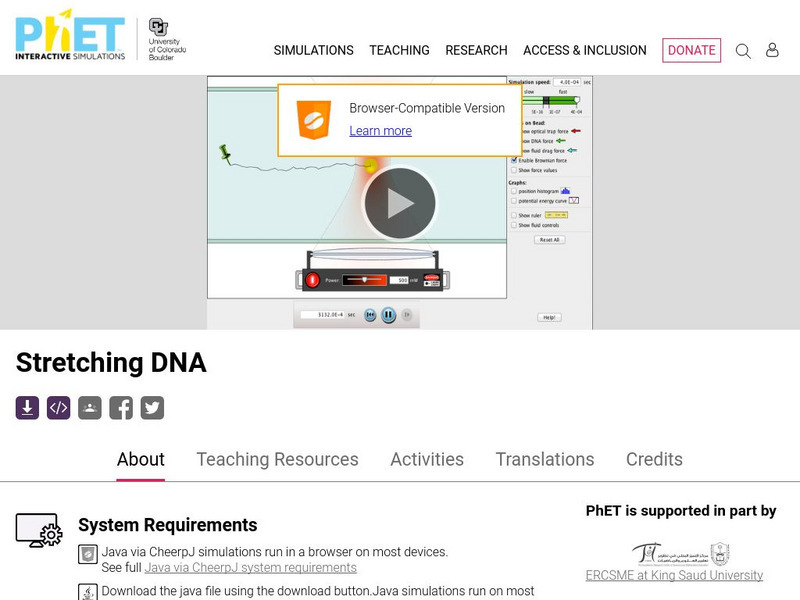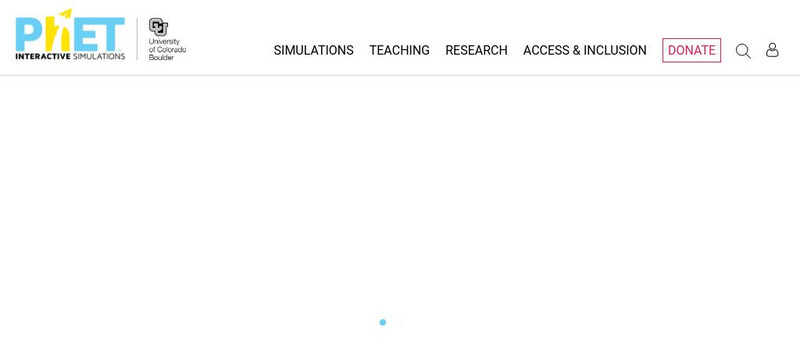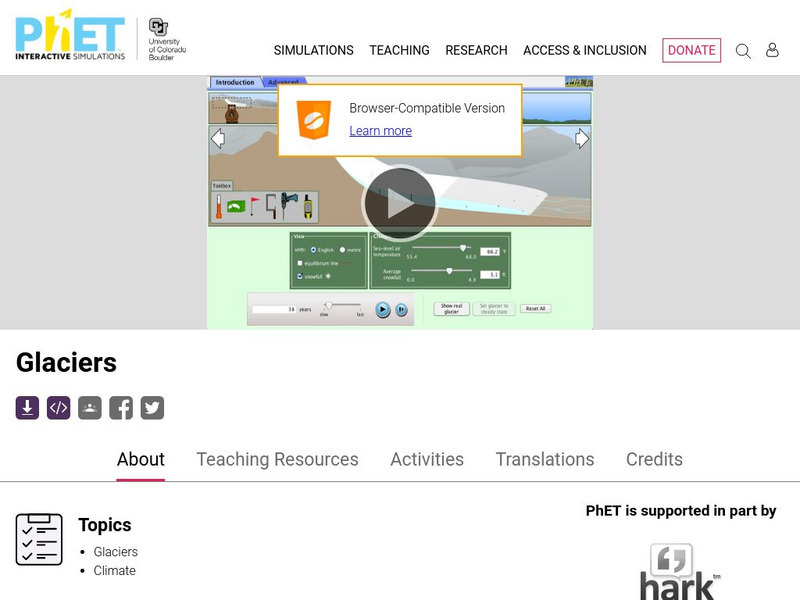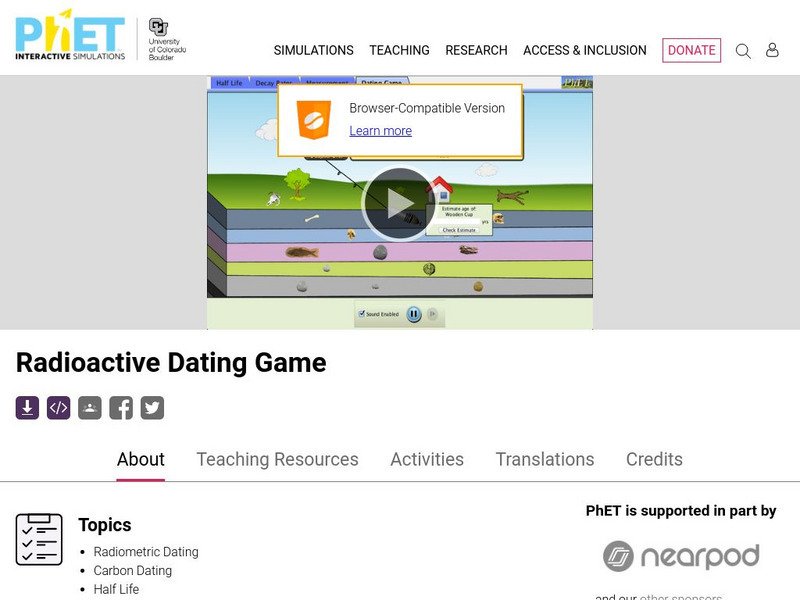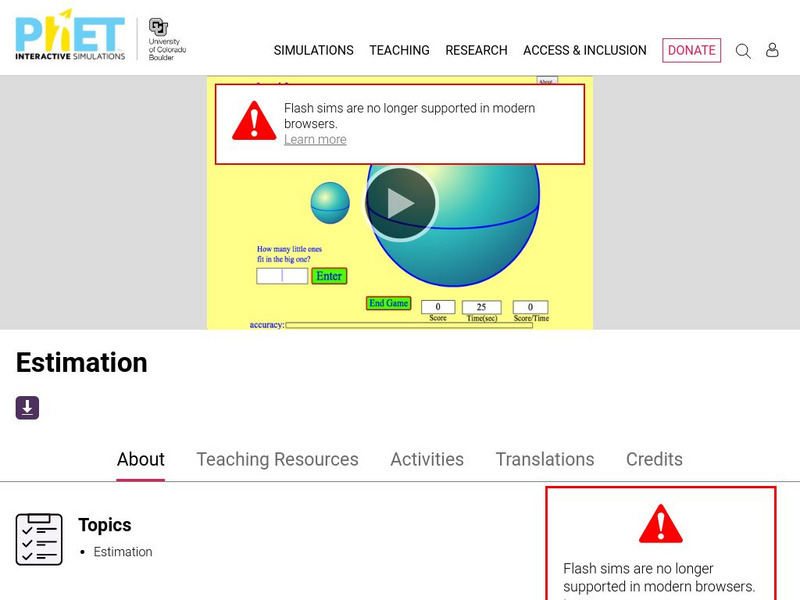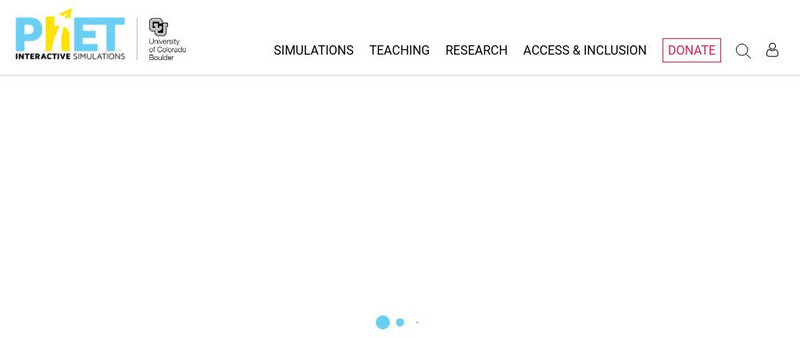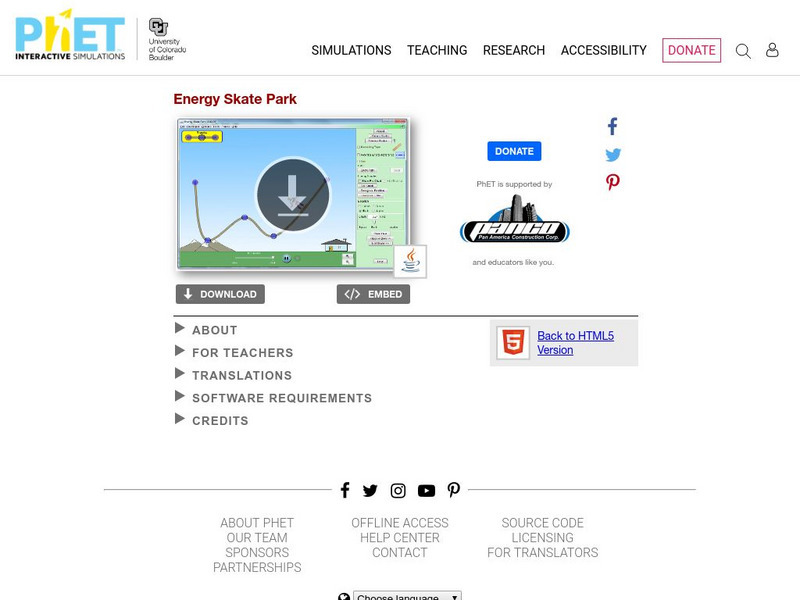University of Colorado
University of Colorado: Ph Et Interactive Simulations: University of Colorado: States of Matter: Basics
An interactive simulation will heat, cool and compress atoms and molecules. Watch as they change between solid, liquid and gas phases. Recognize that different substances have different properties which will affect the temperatures for...
University of Colorado
University of Colorado: Ph Et Interactive Simulations: University of Colorado: Build and Atom
Build an atom out of protons, neutrons, and electrons, and see how the element, charge, and mass change. Then play a game to test how the ideas work!
University of Colorado
University of Colorado: Ph Et Interactive Simulations: P H Scale
In this advanced simulation, students experiment with changing the ion ratios in solutions and thus the pH. The experiment can be viewed on a macroscopic or microscopic level, or customized.
University of Colorado
University of Colorado: Ph Et Interactive Simulations: P H Scale Basics
In this simulation, students learn how changing the concentration of a solution affects the pH level.
University of Colorado
University of Colorado: Ph Et Interactive Simulations: University of Colorado: Membrane Channels
Insert channels in a membrane and observe what happens. See how different types of channels allow particles to move through the membrane.
University of Colorado
University of Colorado: Ph Et Interactive Simulations: Gene Machine: The Lac Operon
Build a gene network. The lac operon is a set of genes which are responsible for the metabolism of lactose in some bacterial cells. Explore the effects of mutations within the lac operon by adding or removing genes from the DNA.
University of Colorado
University of Colorado: Ph Et Interactive Simulations: Stretching Dna
Explore stretching just a single strand of DNA using optical tweezers or fluid flow. Experiment with the forces involved and measure the relationship between the stretched DNA length and the force required to keep it stretched.
University of Colorado
University of Colorado: Ph Et Interactive Simulations: Build a Molecule
Starting from atoms, see how many molecules you can build. Collect your molecules and see them in 3D.
University of Colorado
University of Colorado: Ph Et Interactive Simulations: Molarity
What determines the concentration of a solution? Learn about the relationships between moles, liters, and molarity by adjusting the amount of solute and solution volume. Change solutes to compare different chemical compounds in water.
University of Colorado
University of Colorado: Ph Et Interactive Simulations: Molecule Shapes
Explore molecule shapes by building molecules in 3D. How does molecule shape change with different numbers of bonds and electron pairs? Find out by adding single, double or triple bonds and lone pairs to the central atom. Then, compare...
University of Colorado
University of Colorado: Ph Et Interactive Simulations: Gravity and Orbits
An interactive simulation that teaches about gravitational force, circular motion, and astronomy by manipulating the sun, earth, moon, and a space station to observe the effects of gravity and orbital paths. This simulation can either be...
University of Colorado
University of Colorado: Ph Et Interactive Simulations: Glaciers
Adjust mountain snowfall and temperature to see the glacier grow and shrink. Use scientific tools to measure thickness, velocity and glacial budget.
University of Colorado
University of Colorado: Ph Et Interactive Simulations: The Greenhouse Effect
How do greenhouse gases affect the climate? Explore the atmosphere during the ice age and today.
University of Colorado
University of Colorado: Ph Et Interactive Simulations: Radioactive Dating Game
Learn about different types of radiometric dating, such as carbon dating. Understand how decay and half life work to enable radiometric dating. Play a game that tests your ability to match the percentage of the dating element that...
University of Colorado
University of Colorado: Ph Et Interactive Simulations: Estimation
Explore size estimation in one, two, and three dimensions! Multiple levels of difficulty allow for progressive skill improvement.
University of Colorado
University of Colorado: Ph Et Interactive Simulations: Vector Addition
Learn how to add vectors. Drag vectors onto a graph, change their length and angle, and sum them together. The magnitude, angle, and components of each vector can be displayed in several formats.
University of Colorado
University of Colorado: Ph Et Interactive Simulations: Atomic Interactions
Explore the interactions between various combinations of two atoms. Observe the the total force acting on the atoms or the individual attractive and repulsive forces. Customize the attraction to see how changing the atomic diameter and...
University of Colorado
University of Colorado: Ph Et Interactive Simulations: Charges and Fields
Arrange positive and negative charges in space and view the resulting electric field and electrostatic potential. Plot equipotential lines and discover their relationship to the electric field. Create models of dipoles, capacitors, and...
University of Colorado
University of Colorado: Ph Et Interactive Simulations: Arithmetic
Remember your multiplication tables? Practice your multiplication, division, and factoring skills with this exciting game. No calculators allowed!
University of Colorado
University of Colorado: Ph Et Interactive Simulations: Isotopes and Atomic Mass
Are all atoms of an element the same? How can you tell one isotope from another? Use the sim to learn about isotopes and how abundance relates to the average atomic mass of an element.
University of Colorado
University of Colorado: Ph Et Interactive Simulations: Neuron
Stimulate a neuron and monitor what happens. Pause, rewind, and move forward in time in order to observe the ions as they move across the neuron membrane.
University of Colorado
University of Colorado: Ph Et Interactive Simulations: Trig Tour
Take a tour of trigonometry using degrees or radians! Look for patterns in the values and on the graph when you change the value of theta. Compare the graphs of sine, cosine, and tangent.
University of Colorado
University of Colorado: Ph Et Interactive Simulations: Circuit Construction Kit (Dc Only), Virtual Lab
Build circuits with resistors, light bulbs, batteries, and switches and take measurements with laboratory equipment like the realistic ammeter and voltmeter.
University of Colorado
University of Colorado: Ph Et Interactive Simulations: Energy Skate Park
An interactive skate park simulation that teaches about energy, conservation of energy, kinetic energy, potential energy, and friction. This simulation can either be downloaded or played online and includes handouts, lesson plans, and...








